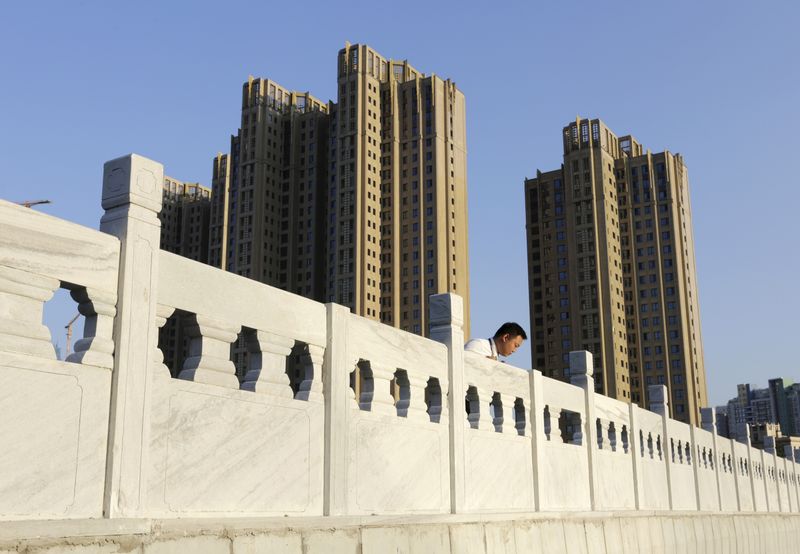
© Reuters. A property representative employee bases on a bridge near brand-new apartment or condo obstructs in Beijing’s Wangjing location, China, September 18, 2015. REUTERS/Jason Lee/File Image
By Samuel Shen and Vidya Ranganathan
SHANGHAI/SINGAPORE (Reuters) – China’s property financial investment items are toppling, extending in 2015’s depression as financiers lose expect a healing in the economy and residential or commercial property possessions such as commercial parks and logistics centers.
Chinese property financial investment trusts (REITs), which provide shares to financiers versus a portfolio of property holdings, have actually struck succeeding lows in the very first couple of days of 2024.
After toppling 28% in 2023, the CSI REITs Index has actually dropped another 6.4% this year through an uncommon, seven-day losing streak driven by one REITs supervisor’s disclosure of cuts in storage facility leasing rates and more comprehensive worries of falling yields.
The selloff shows toppling self-confidence in an economy where a deepening residential or commercial property crisis, deteriorating intake and sputtering organization activities have actually sapped need for office complex, storage facilities and shopping center.
It likewise makes complex Beijing’s efforts to entice financiers into a nascent REIT market created to carry terribly required money to indebted city governments and residential or commercial property designers.
” In a financial sag, it’s getting harder and harder for REITs to generate income,” stated Xia Chun, primary financial expert at Forthright Holdings Co.
Although REITs obtain yields from fairly steady charge or rental earnings created by underlying possessions such as workplace towers or storage facilities, Xia stated REITs trade more like stocks than bonds, with huge ups and downs, especially in China.
After some preliminary enjoyment after its 2020 launch, China’s REIT market has actually experienced an eye-watering bubble burst. The REITs index has actually almost cut in half from its early 2022 peak.
The majority of China’s 29 noted REITs are backed by facilities possessions such as commercial parks, tollways and sewage treatment plants. Other REITs backed by going shopping malls and grocery stores will be introduced this month.
GREATEST CASUALTIES
In the most recent bout of unrelenting selling, REITs backed by logistics residential or commercial properties were amongst the most significant casualties.
The Harvest Jingdong Warehousing and Logistics REIT has actually toppled approximately 30% this year, taking a hit after its Jan. 4 disclosure that leasing charges at an underlying warehousing job in main Wuhan city had actually been cut by 13% in the brand-new year.
CICC GLP Warehousing Logistics likewise plunged to tape-record lows on worries it would be likewise impacted.
Financiers likewise discarded REITs backed by commercial parks in the middle of indications job rates are skyrocketing. Job at retail residential or commercial properties reached 9.1% at the end of September, from less than 6% in 2019, according to CBRE, revealing the remaining effect on intake from the COVID pandemic.
The Hua An Zhangjiang Industrial Park REIT has actually plunged 24% this year. Just 61% of area at an office complex in Shanghai was leased at the end of 2023, below 94% 6 months previously, its possession supervisor divulged, pointing out the loss of an essential renter.
Another REIT, CCB Principal Zhongguangcun Industrial Park, whose earnings is made up of workplace leas from tech start-ups in Beijing, has actually stated federal government crackdowns on the web sector and financial challenge had actually raised job rates.
The disaster has actually set off a multitude of stabilisation steps by REIT supervisors, consisting of trading suspensions, increased openness, and financial investments by underlying residential or commercial properties’ most significant owners.
Fu Lei, senior executive at Tebon Possession Management, stated China’s REIT market is controlled by risk-averse institutional financiers.
That suggests volatility “activates a rush for the exit … which in turn amplifies state of mind swings and welcomes more volatility”, he informed an online roadshow on Wednesday.
Some financiers, nevertheless, sense chance.
With many Chinese REITs trading listed below book worth, and their money dividend ratio climbing up above 4.5%, “REITs are more enticing now than the majority of China’s equity or bond possessions”, stated Liu Xianyu, scientist of FoF financial investment at E Fund Management Co.
.